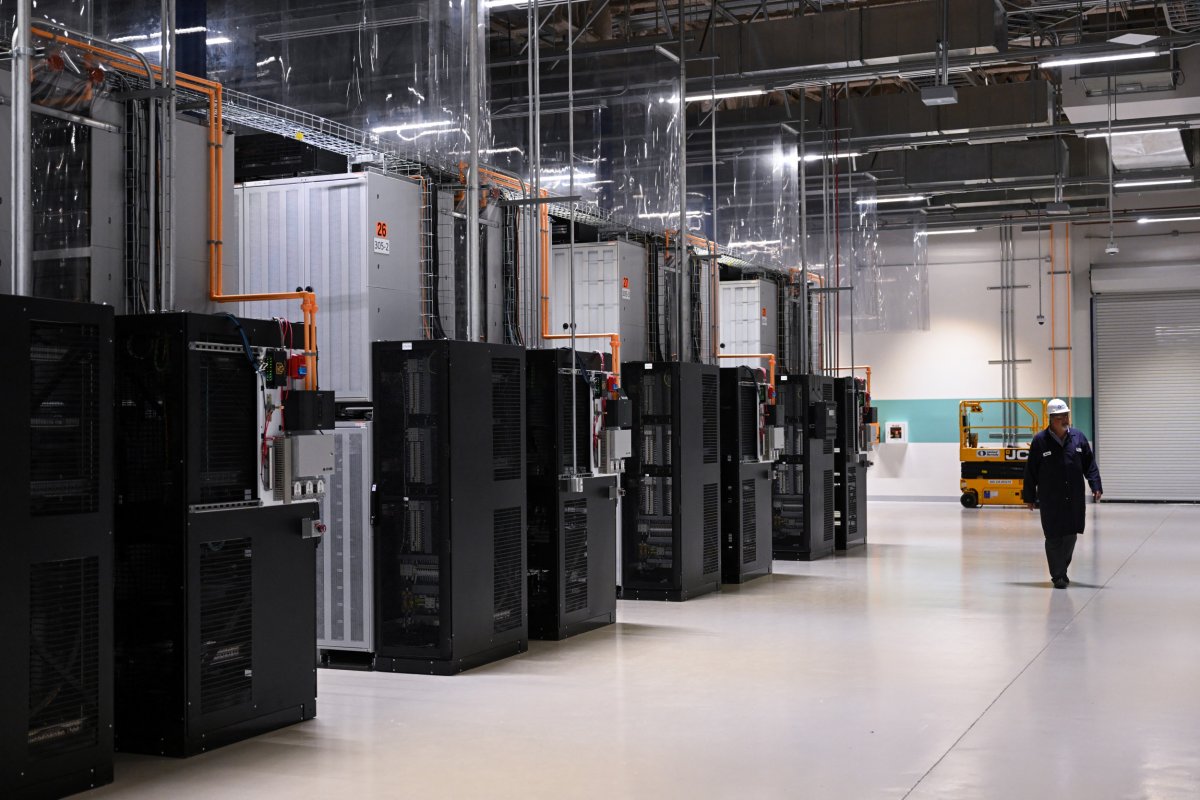Grid-scale battery storage companies make $100B US manufacturing pledge
April 29, 2025
A coalition of companies making and using large batteries for energy storage on the electric grid announced Tuesday a $100 billion investment commitment to make and buy grid batteries in the U.S.
“We’re investing to ensure that in five years, every part of the energy storage industry is anchored here in America,” American Clean Power (ACP) CEO Jason Grumet said at an announcement event on Capitol Hill. ACP is a trade group representing companies along the entire clean energy supply chain. Grumet said the investment goal announced Tuesday is expected to generate 350,000 jobs and help power companies supply more electricity. “Storage is absolutely essential to meet skyrocketing demand,” he said.
Electricity demand is surging globally and in the U.S. due to the electrification of more appliances and home heating, the switch to EVs and the booming growth of power-hungry data centers.
Renewable energy, especially solar, has become one of the cheapest and fastest ways to add more power supply. Large-scale battery storage helps to overcome the challenges from the intermittent nature of energy derived from the sun and wind, allowing power companies to match supply with times of peak demand. Storage can also help electric utility companies make the grid more resilient to interruptions from extreme weather, avoiding costly and dangerous outages.

Workers assembling an iron-based battery at the Form Energy factory in Weirton, West Virginia. The clean energy company is creating much-needed jobs on the grounds of a former steel mill deep in Appalachian coal country.
Courtesy of Form Energy
The Energy Information Administration reported that a little more than 80 percent of the new electricity generation capacity added to the U.S. grid last year was a combination of solar and battery storage.
ACP said companies that are already expanding or building new battery facilities include Tesla in Nevada, Fluence in Tennessee, LG Energy Solution in Michigan and Form Energy in West Virginia.
“We need clean power, we need more power and we need the ability to store power,” West Virginia Senator Shelley Moore Capito said at the event. Form Energy’s facility in Weirton, West Virginia sits on property once occupied by a now-shuttered steel mill, and the battery maker has created much-needed jobs in the rust belt community along the Ohio River.
Capito’s support for clean energy is remarkable given that her home state’s once-dominant coal industry is often at odds with renewable energy, and Capito frequently joins her fellow Republicans in opposing climate action such as limits on greenhouse gas emissions.
Capito and every other Republican in Congress in 2022 opposed the Inflation Reduction Act (IRA), the country’s most ambitious climate action in history. But renewable energy and the manufacturing activity related to the IRA have attracted more bipartisan support as big-money investments for clean tech facilities triggered by the law landed in Republican Districts and red states.
The ACP event leaned into that bipartisan appeal, featuring two Republican lawmakers and no Democrats, and replacing any talk of climate action with phrases crafted for more Conservative appeal such as American competitiveness, economic growth, national energy security and an “all of the above” approach to energy.
The companies ACP represents will need bipartisan support to salvage the most critical aspects of the IRA as the Trump administration and Congressional Republicans set about dismantling most of its climate-related components. The law’s tax credits that support clean energy and domestic production of clean tech equipment are especially crucial.
Mike Snyder, VP of Energy & Charging for Tesla, said at the event that tax credits are important for his company’s effort to build all parts of batteries in the U.S.
Tesla is best known as an EV maker, but the company also has a substantial presence in building batteries for grid storage.
Snyder said the most expensive component of Tesla’s Megapack battery is the battery cell, which is primarily made in China.
“The difficult part of the supply chain is to figure out how to extract it from Chinese companies making the cells to U.S. companies,” he said.

Inside the AES Alamitos Battery Energy Storage System, which provides stored renewable energy to supply electricity during peak demand periods, in Long Beach, California.
Patrick Fallon/AFP via Getty Images
Tax credits help “make the economics work” to start domestic production, he said. Tesla is expanding its Nevada facility to make more battery cells, Snyder said, and investing in a new facility in Houston to produce more Megapacks.
Arizona Republican Representative Juan Ciscomani said he joined nearly two dozen other Republican House members on a letter urging party leaders to keep the clean energy tax credits in place as Congress debates a budget proposal with deep spending cuts.
“Arizona has seen a substantial amount of investment from different companies taking advantage of those tax credits,” Ciscomani said. “It made sense for me to stand up for that.”
Battery maker Fluence has a facility in Arizona and employees from that company and other battery manufacturers planned to visit lawmakers in a day of lobbying in support of the tax credits.
Previous lobbying blitzes brought corporate leaders from a range of industries to Capitol Hill to explain the job growth happening as a result of the tax policy, and the effort appears to be bearing fruit. In addition to the letter from House Republicans, four influential Republican Senators wrote a similar letter of support for keeping clean energy tax credits in place.
However, the Trump administration remains opposed. Last week—during Earth Week—Trump’s Energy Secretary Chris Wright, a former gas fracking company executive, bashed the tax credits in an appearance on a Fox Business program.
“I think it’s a big mistake,” Wright said on the program. “That term ‘clean energy’ is just a marketing term. There’s no clean energy; all energy sources involve tradeoffs.”
Wright was referring to the emissions produced from the manufacturing of batteries, solar panels, wind turbines and other renewable energy components and the mining and refining of critical minerals that go into that equipment.
Research shows that Wright’s comments are misleading. The amount of pollution associated with the life cycle of renewable energy equipment is tiny compared to the pollution and greenhouse emissions from most fossil fuels.
Form Energy Co-founder & CEO Mateo Jaramillo’s company is creating jobs deep in the heart of coal country. Jaramillo said at the ACP event that he thinks clean energy, and especially energy storage, is becoming a more bipartisan issue.
“It is a large, new U.S. industry that we can have right here,” he said. “That crosses a lot of the political spectrum.”
Search
RECENT PRESS RELEASES
Related Post




